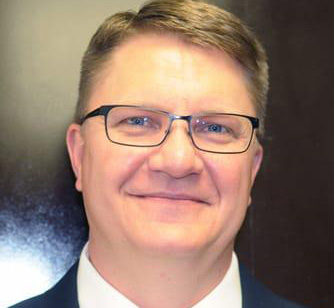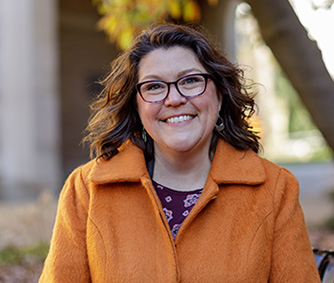Published on

Jerry Frank
Associate Professor, Dept. of History, Interim Academic Director for Freshman Interest Groups (FIGs)
This semester, several of the student success subcommittees are focusing on different aspects of the first-year experience, including Summer Welcome, Mizzou Welcome, the first-year seminar and the Freshman Interest Groups (FIGs). These subcommittees look at what role these initiatives play in retention by gathering data in order to make suggestions for future improvements.
FIGs are one of the new student programs being reimagined. FIGs are groups of 15-20 first-year students living together and attending many classes together. They have access to a faculty mentor and a peer leader, who also lives with them. FIGs bring together students with common interests and majors in order to foster a sense of belonging so that new students feel more engaged and connected within the larger campus community.
Jerry Frank, an associate professor of history, has been interim director of the FIGs program for about three years. When he was approached by Dr. Jim Spain to become involved, he was drawn in by the success of the program.
“I simply couldn’t pass up the opportunity to contribute to a storied program with such incredible potential to transform our students’ lives and our campus,” he said.
The FIGs program has a proven track record of improving students’ sense of belonging and community while they are at MU.
“For example, our last cohort marked the fourth consecutive year with an overall FTC retention rate above 90%, which is a programmatic record,” Frank said. “In that year alone our FTC retention reached an overall rate 91.3% and our College of Business FIGs achieved an incredible retention rate of 96.6%.”
Retention rates for first-generation students, underrepresented minority students and Pell-eligible students outperformed those of their peers not in a FIG.
The FIGs program is being reimagined as it is approaching its 30th anniversary next year. The program redesign will remove financial barriers to involvement for all students and make it easier for students to participate who will benefit the most, such as first-generation, underrepresented minority students, and those eligible for Pell grants.
In addition, Frank says, “The newly designed program will also include a more robust leadership training process for our peer learning advisors; more resources for imbedding high-impact practices in the curriculum; and a simpler process for faculty and staff participation,”
In addition to the data, student success stories come from the former students themselves. Frank tells of the History department recently hosting a MU graduate in the History department, who participated in a FIG program during her time at Mizzou.
She came from out of state and the FIG program “was instrumental in helping her feel at home at Mizzou by integrating her in a community of students, faculty and staff who shared the same professional interests,” Frank said.
Students and parents alike can feel at ease with the transition to college knowing that a new, and often, unfamiliar place will soon feel like home.
“It’s easy to forget in the rush of move-in day what that moment truly represents.” Frank said. “In a very real way, that day is the culmination of a lifetime of doing homework, rushing to band or volleyball practice, careful discussions about the importance and value of an education, and the fragile work of self-discovery. That day is also a powerful statement on the part of parents and our incoming freshmen. In arriving on our campus our students and their families are telling us that they trust the entirety of the MU community to care for, look out for, and develop those students into the leaders of tomorrow.”
FIGs play a role in student retention, provide a built-in study group, and also set students up for future success by helping to build professional networks, and train future leaders who serve as peer advisors.
The current themes of the FIGs are listed on the Academic Success Programs webpage.

Megan Silvey, Director of Student Communications
Summer Welcome and Welcome Week messages for new students are going to look a little bit different this year, thanks to improvements being made by many people already working behind the scenes.
Megan Silvey and her team in Student Communications are one part of a larger group involved in helping to unify the messages new Tigers will be receiving.
“The updates for Summer Welcome 2023 are born from a collaboration between New Student Programs and Student Communications (Enrollment Management Communications, Student Affairs, Office of the Vice Provost for Undergraduate Studies) to really maximize the time we have students and families here on our campus to build a sense of engagement – connection to the people and the places that make Mizzou unique and our students successful,” Silvey said. “All the same content we’ve traditionally delivered to new Tigers is still accounted for – we just took a fresh, strategic look at what needs to be delivered when we have them here, and what can be delivered in other ways, or at other times.”
It takes a lot of staff members to help support these efforts, from advisors to student success program directors, and front-line staff, who put on Summer Welcome and Welcome Week. Silvey credits other key players, including David Rielley, senior coordinator, New Student Programs; Mary Ann Rotert, director, Enrollment Management Marketing & Communications; and Heather Bridgeford, director, Marketing and Communication in Student Affairs.
This year, there are more opportunities for faculty and staff to be engaged in these changes.
“One new thing we’re particularly excited about for this year is a Summer Welcome ‘dress rehearsal,’” says Silvey, “This is a chance for faculty, staff and others to come see the presentations that will be delivered to students and families when they’re here.”
This will be held on April 26 in Jesse Wrench Auditorium from 1-4 p.m.
Why are these new student initiatives so important?
“All the work we’re doing to tweak Summer Welcome and Welcome Week is part of a larger effort involving a lot of people who are working on a comprehensive student success and retention strategy aimed at more consistent support of incoming students from the time they’re admitted until the end of their first year,” Silvey said. “Dr. Spain has convened a working group and early conversations have yielded some really innovative ideas. I’m proud and excited to be part of it.”
Plans for Welcome Week’s schedule of events in August are already being made, so Summer Welcome staff can engage with both new Tigers and their parents about all of the activities and traditions they can look forward to, such as Tiger Walk. Angela King Taylor, associate dean of students, and her team, have had a lot to do with the preparation so that there will be more opportunities for involvement and meeting people as soon as students arrive, Silvey said.
New students receive a lot of information, some of it involving actions they need to take by certain deadlines, and then also some other information we want them to be aware of, so they can find their own path to success, such as involvement in clubs, FIGs, or study abroad programs.
“Organizing that into a seamless story – regardless of what major they choose, what office they’re in, where they live or how they came to be here is an important first step,” Silvey said. “That’s what these updates to Summer Welcome and Welcome Week are aimed at. The next step is then to personalize that story for each student based on what makes them unique. Look for more on that as we head into Summer Welcome 2024!”
View more information on Summer Welcome and other New Student Programs and the schedule for Welcome Week 2023.